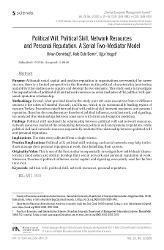| dc.contributor.author | Demirbağ, Orkun | |
| dc.contributor.author | Demir, Hale | |
| dc.contributor.author | Yozgat, Uğur | |
| dc.date.accessioned | 2021-01-28T13:30:53Z | |
| dc.date.available | 2021-01-28T13:30:53Z | |
| dc.date.issued | 2020 | |
| dc.identifier.issn | 2658-0845 | en_US |
| dc.identifier.issn | 2658-2430 | en_US |
| dc.identifier.uri | https://hdl.handle.net/20.500.12469/3792 | |
| dc.identifier.uri | https://doi.org/10.7206/cemj.2658-0845.26 | |
| dc.description.abstract | Purpose: Although social capital and positive reputation in organizations are essential for career success, there is a limited perspective in the literature on the political characteristics (motivation and ability) that enable one to acquire and develop the two elements. This study seeks to investigate the sequential role of political skill and network resources as serial mediators of the political will-personal reputation relationship.
Methodology: In total, what provided data for the study were 457 sales executives from 13 different sectors in the cities of Istanbul, Kocaeli, and Bursa, which is an economically leading region of western Turkey. Executives rated their political will, political skill network resources, and personal reputation. Based on the complementary theories of political influence, social network, and signaling, we analyzed the relationships between constructs with structural equation modeling.
Findings: Political skill mediated the relationship between political will and network resources, network resources mediated the relationship between political skill and personal reputation, while political skill and network resources sequentially mediated the relationship between political will and personal reputation.
Implications: The data were collected from a single source.
Practical Implications: Political will, political skill training, and social networks may help individuals manage their personal reputation at work, thus benefiting their careers.
Originality/Value: This is one of the first studies to sequentially investigate how individuals' characteristics (motivation and ability) develop their social network and personal reputation at work. Moreover, theories of political influence, social capital, and signaling were jointly used for the first time ever. | en_US |
| dc.description.sponsorship | Ministry of Science and Higher Education, Poland | en_US |
| dc.language.iso | eng | en_US |
| dc.publisher | Sciendo | en_US |
| dc.rights | info:eu-repo/semantics/openAccess | en_US |
| dc.subject | Political Will | en_US |
| dc.subject | Political Skill | en_US |
| dc.subject | Network Resources | en_US |
| dc.subject | Personal Reputation | en_US |
| dc.title | Political Will, Political Skill, Network Resources and Personal Reputation: A Serial Two-Mediator Model | en_US |
| dc.type | article | en_US |
| dc.identifier.startpage | 26 | en_US |
| dc.identifier.endpage | 56 | en_US |
| dc.relation.journal | Central European Management Journal | en_US |
| dc.identifier.issue | 3 | en_US |
| dc.identifier.volume | 28 | en_US |
| dc.department | Fakülteler, İşletme Fakültesi, İşletme Bölümü | en_US |
| dc.identifier.wos | WOS:000592838200002 | en_US |
| dc.identifier.doi | 10.7206/cemj.2658-0845.26 | en_US |
| dc.identifier.scopus | 2-s2.0-85109165048 | en_US |
| dc.institutionauthor | Demir, Hale | en_US |
| dc.relation.publicationcategory | Makale - Uluslararası Hakemli Dergi - Kurum Öğretim Elemanı | en_US |
















